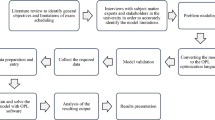Abstract
Examination scheduling is a challenging and time consuming activity among academic administrators of colleges and universities. This is because it involves scheduling a set of exams within a limited number of timeslots, assigning invigilators for each exam and satisfying a set of defined constraints. Scheduling is done to avoid cases in which students sit for more than one exam at the same time or invigilators invigilate more than one exam in different examination venue at the same time or the exams set exceeded the venue capacity. To overcome these challenges, we developed an incremental software model based on greedy algorithm to structure, plan and control the process of an automated schedule construction. Incremental development model using greedy algorithm (IMGA) is used to prioritize the hard and soft constraints and optimize exam scheduling problems. IMGA assigns exams to resources (e.g.: time periods and venues) based on a number of rules. When rules defined are not applicable to the current partial solution, a backtracking is executed in order to find a solution which satisfies all constraints. These processes are done through adaptation of greedy algorithm. Our algorithm iteratively makes one choice after another in order to minimize the conflicts that may have arisen. The advantage of IMGA is that it provides clear-cut solutions to smaller instances of a problem and hence, makes the problem easier to be understood.
Access this chapter
Tax calculation will be finalised at checkout
Purchases are for personal use only
Similar content being viewed by others
References
Ayob, M., et al.: Intelligent examination timetabling software. Procedia-Soc. Behav. Sci. 18(1), 600–608 (2011)
Alzaqebah, M., Abdullah, S.: Hybrid bee colony optimization for examination timetabling problems. Comput. Oper. Res. 54, 142–154 (2015)
Babaei, H., Karimpour, J., Hadidi, A.: A survey of approaches for university course timetabling problem. Comput. Ind. Eng. 86, 43–59 (2015)
Balakrishnan, N., Lucena, A., Wong, R.T.: Scheduling examinations to reduce second-order conflicts. Comput. Oper. Res. 19(5), 353–361 (1992)
Elloumi, A., Kamoun, H., Jarboui, B., Dammak, A.: The classroom assignment problem: complexity, size reduction and heuristics. Appl. Soft Comput. 14, 677–686 (2014)
Leite, N., Fernandes, C.M., Melício, F., Rosa, A.C.: A cellular memetic algorithm for the examination timetabling problem. Comput. Oper. Res. 94, 118–138 (2018)
Muklason, A., Parkes, A.J., Özcan, E., McCollum, B., McMullan, P.: Fairness in examination timetabling: student preferences and extended formulations. Appl. Soft Comput. 55, 302–318 (2017)
Pillay, N., Banzhaf, W.: An informed genetic algorithm for the examination timetabling problem. Appl. Soft Comput. 10(2), 457–467 (2010)
Qaurooni, D., Akbarzadeh-T, M.R.: Course timetabling using evolutionary operators. Appl. Soft Comput. 13(5), 2504–2514 (2013)
Rahman, S.A., Bargiela, A., Burke, E.K., Özcan, E., McCollum, B., McMullan, P.: Adaptive linear combination of heuristic orderings in constructing examination timetables. Eur. J. Oper. Res. 232(2), 287–297 (2014)
Saviniec, L., Santos, M.O., Costa, A.M.: Parallel local search algorithms for high school timetabling problems. Eur. J. Oper. Res. 265(1), 81–98 (2018)
Saviniec, L., Constantino, A.: Effective local search algorithms for high school timetabling problems. Appl. Soft Comput. 60, 363–373 (2017)
Sagir, M., Ozturk, Z.K.: Exam scheduling: mathematical modeling and parameter estimation with the analytic network process approach. Math. Comput. Model. 52(5–6), 930–941 (2010)
Song, T., Liu, S., Tang, X., Peng, X., Chen, M.: An iterated local search algorithm for the University Course Timetabling Problem. Appl. Soft Comput. 68, 597–608 (2018)
Turabieh, H., Abdullah, S.: An integrated hybrid approach to the examination timetabling problem. Omega 39(6), 598–607 (2011)
Kahar, M.N.M., Kendall, G.: The examination timetabling problem at Universiti Malaysia Pahang: comparison of a constructive heuristic with an existing software solution. Eur. J. Oper. Res. 207(2), 557–565 (2010)
Woumans, G., De Boeck, L., Beliën, J., Creemers, S.: A column generation approach for solving the examination-timetabling problem. Eur. J. Oper. Res. 253(1), 178–194 (2016)
Amaral, P., Pais, T.C.: Compromise ratio with weighting functions in a Tabu Search multi-criteria approach to examination timetabling. Comput. Oper. Res. 72, 160–174 (2016)
Koulinas, G.K., Anagnostopoulos, K.P.: A new tabu search-based hyper-heuristic algorithm for solving construction leveling problems with limited resource availabilities. Autom. Constr. 31, 169–175 (2013)
Perkusich, M., Soares, G., Almeida, H., Perkusich, A.: A procedure to detect problems of processes in software development projects using Bayesian networks. Expert Syst. Appl. 42(1), 437–450 (2015)
Lei, H., Ganjeizadeh, F., Jayachandran, P.K., Ozcan, P.A.: Statistical analysis of the effects of Scrum and Kanban on software development projects. Robot. Comput.-Integr. Manuf. 43, 59–67 (2017)
Qureshi, M.R.J., Hussain, S.A.: An adaptive software development process model. Adv. Eng. Softw. 39(8), 654–658 (2008)
Acknowledgements
The authors are grateful to the Research Management Centre (RMC) UiTM for the support under the national Fundamental Research Grant Scheme (600-IRMI/FRGS 5/3).
Author information
Authors and Affiliations
Corresponding author
Editor information
Editors and Affiliations
Rights and permissions
Copyright information
© 2019 Springer Nature Singapore Pte Ltd.
About this paper
Cite this paper
Najafabadi, M.K., Mohamed, A. (2019). Incremental Software Development Model for Solving Exam Scheduling Problems. In: Yap, B., Mohamed, A., Berry, M. (eds) Soft Computing in Data Science. SCDS 2018. Communications in Computer and Information Science, vol 937. Springer, Singapore. https://doi.org/10.1007/978-981-13-3441-2_17
Download citation
DOI: https://doi.org/10.1007/978-981-13-3441-2_17
Published:
Publisher Name: Springer, Singapore
Print ISBN: 978-981-13-3440-5
Online ISBN: 978-981-13-3441-2
eBook Packages: Computer ScienceComputer Science (R0)




